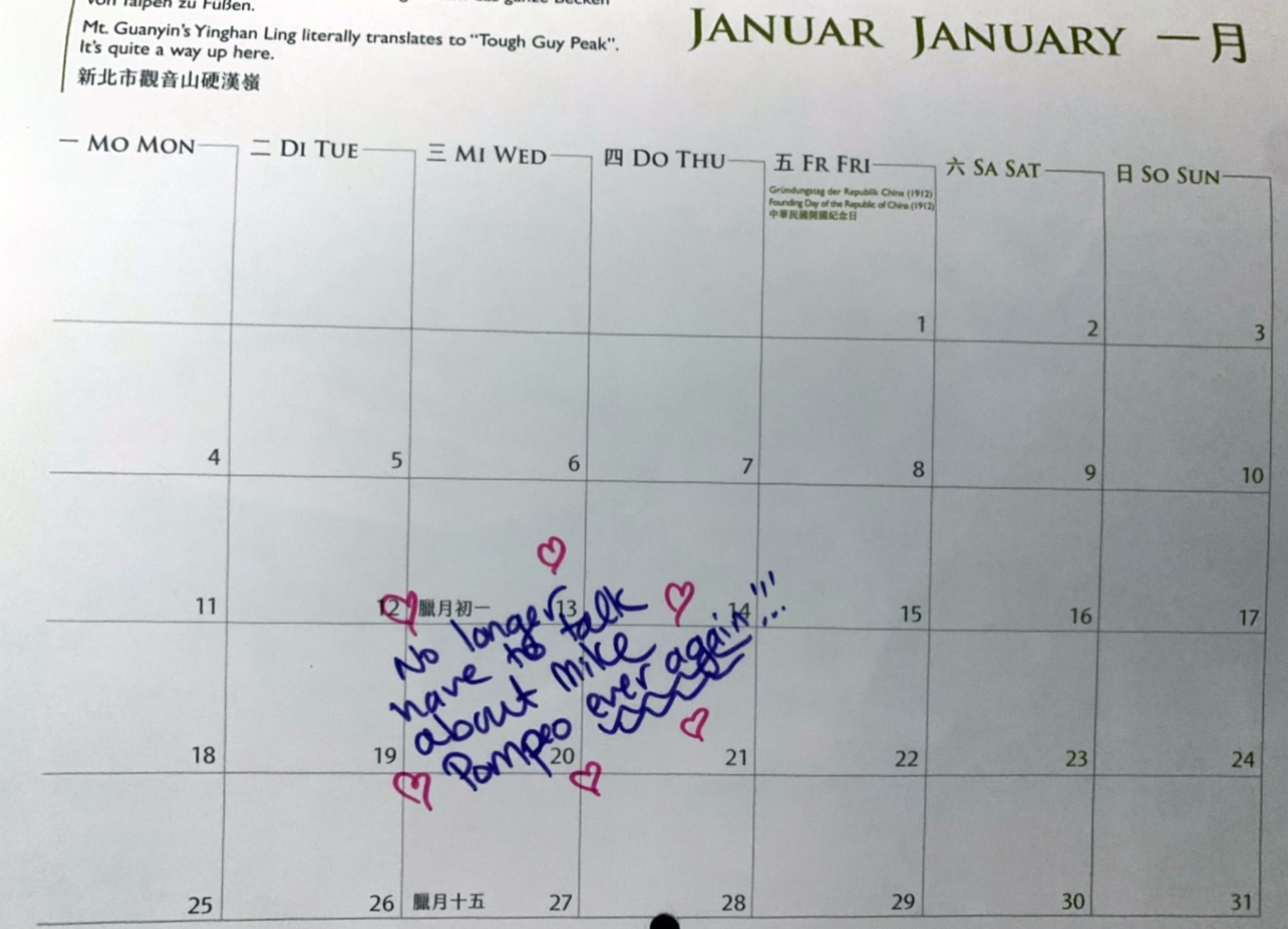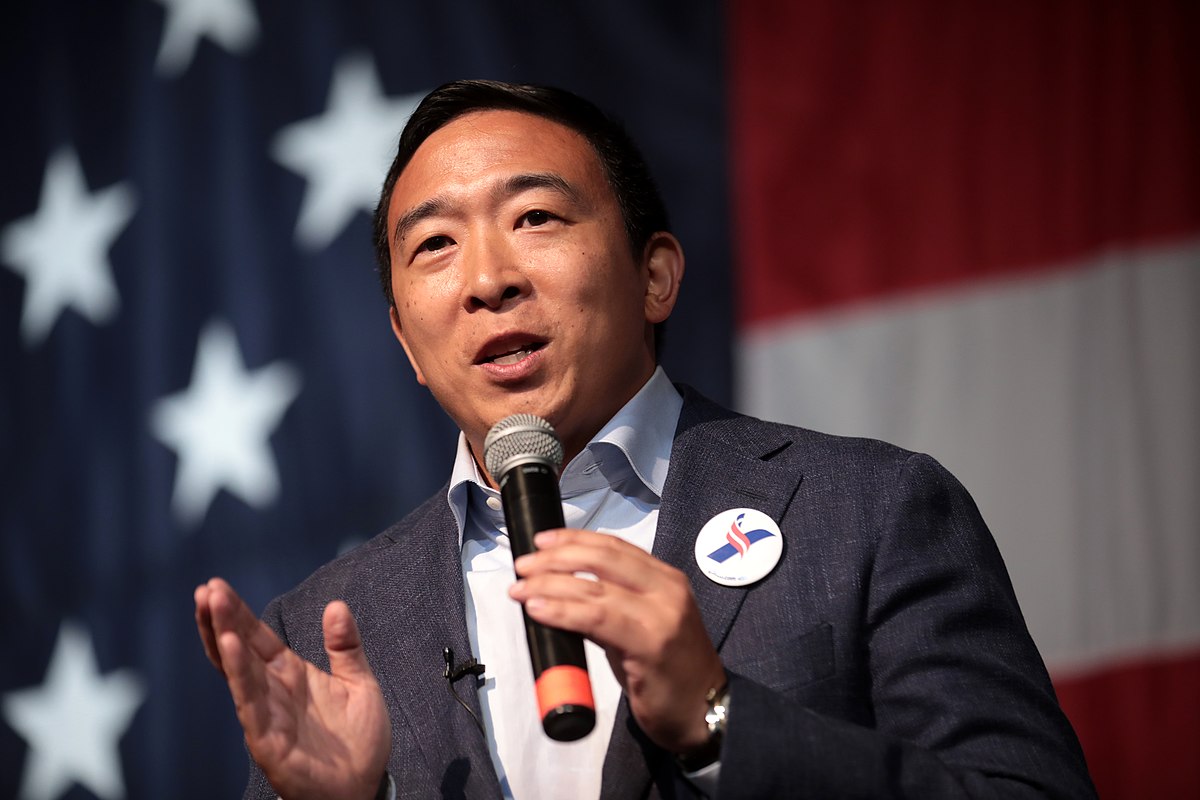
I'd intended for my next post to be a light and lovely review of Spinning Karma, a new "Buddhist comedy" novel by Lonely Planet author (and personal friend) Joshua Samuel Brown. But, things are happening and it seems before we get to the escapist fun the world desperately needs, we have to talk about Mike Pompeo.
I pretty much never want to talk about Mike Pompeo and am looking forward to the day when I don't have to anymore, so I don't really want to do this. I'll try to keep it short.
In what DW has called a "flurry of activity" before leaving office, the State Department under Pompeo has been wrapping up all sorts of policy agenda items, some horrific and one quite good. The better actions included stating openly that "Taiwan is not a part of China", announcing (and later canceling, amid a stack of other cancellations) the visit of the US ambassador to the UN to Taiwan, and most importantly, lifting self-imposed restrictions on how the US deals with Taiwan, which he said were always more about placating Beijing than any sort of useful policy within the context of US-Taiwan relations.
Although it's not directly related, I also want to point out that bipartisan support for Taiwan remains strong, as they have been pushing the State Department to actively address the US's Taiwan policy. (Edit: writing this late at night, I initially got that backwards. It's fixed here.) In that context, Pompeo's actions on Taiwan seem to be a positive response to continuing bipartisan efforts to improve US-Taiwan relations.
What's more, a recently declassified document from the NSC states US intentions to help Taiwan develop an asymmetric defense strategy, strengthen ties with Taiwan (which it lists among "allies and partners"), curb Chinese aggression towards "allies and partners" (presumably including Taiwan) and defend the "first island chain, including Taiwan". So the US has had a pretty strong, albeit classified, stance on Taiwan since at least 2018.
That's worth knowing: whatever you think of Pompeo's recent moves, they were backed up by concrete policy that went beyond him, not showmanship. When erstwhile anti-CCP allies in Asia such as Ted Cruz betray the causes they claim to support, it's easy to assume that allies, especially right-wing ones, will always let one down. That's only sometimes true.
Some are saying Pompeo's moves are a much-needed change in US-China and US-Taiwan policy: that movements in the right direction are boons regardless of where they come from. Some say that he's doing Biden a favor by relieving the next Secretary of State -- almost certainly Antony Blinken -- of the question of whether to make these moves. Others believe that Taiwan continues to be a gamepiece in an inartfully-executed US-China spat, which would be nothing new. Still others call these moves "landmines" or "sabotage" for the incoming Biden administration. I can't read the piece fully because I don't subscribe to Foreign Policy, but one view is that it amounts to opportunism and politicization, potentially turning Taiwan into a Republican issue (honestly, though, if some see it that way, that ship has already sailed. If they don't, these moves aren't likely to change that).
I personally agree with those who say policy advancements on Taiwan are a good thing overall, but would have been better in Pompeo's tenure at a less-volatile time, making these changes normalized enough that it would be difficult for the Biden administration to overturn them.
But, I'll honestly take it over their doing nothing. Besides, given everything above, I am willing to give Pompeo the benefit of the doubt on this. I am choosing to believe that he genuinely believes he is doing the right thing, perhaps not for Taiwan's sake, but for whatever policy objective he wants to accomplish through supporting Taiwan. This is despite knowing that Taiwan is the one issue he's right about, and that on the whole I'll be overjoyed to see him go. That his moves have all been symbolic, unofficial or non-binding further give me the impression that he's attempting not to force the incoming administration into any immediate action that China might choose to be offended by, but rather laying out for the next administration what he thinks they should do on this particular issue.
In fact, if they'd done more at this late hour, and forced Biden's cabinet on a path that they may have wanted to negotiate in their own way, I'd be more likely to think that the goal was to sabotage the Democrats. These fairly mild moves, only seen as revolutionary because China has convinced the world that any kindness to Taiwan is an unforgivable affront when it need not be, hint that they are likely not backed by malicious intent.
Other moves support this view, such as banning imports of certain products from East Turkestan (Xinjiang), where China is thought to be enslaving Uighurs in labor camps. China is furious about every single one of these policy announcements, and the US knows that, yet it's choosing to do the right thing anyway. If "upsetting relations with China" is the only goal, you'd just do whatever you wanted to accomplish that, like set a bunch of tariffs that US consumers would end up paying for (I do believe the move was politically justified; I also don't believe it worked well).
That appears to have been Trump's goal at one time, in between calling Xi Jinping a "very good friend" and having all sorts of other things going on under the table, but I don't think it's Pompeo's. You wouldn't make a series of justified, ethically above-board moves that specifically target the areas where the Chinese government have been acting abhorrently, to the point of committing human rights atrocities, if you just wanted to 'own the libs'.
Trump, of course gets no such benefit of any doubt from me. The only reason I think he can find Taiwan on a map is because he allegedly compared it to the tip of a pen. It's been clear for awhile that the Trump administration's Taiwan policy has had nothing to do with Trump himself, and we are better for it.
Where does that leave us in US-Taiwan relations, then?
With a week before the inauguration, it leaves us with the Biden administration. Whether Pompeo's actions on Taiwan are intentional "landmines", parting shots at China just because, or a bridge to improved Taiwan policy across administrations and partisan lines lies entirely with how the State Department under Biden reacts to them.
If Blinken and "Indo-Pacific Coordinator" Kurt Campbell -- presumably -- do nothing to reverse these moves and do not default to the old self-censorship model of China appeasement, then Pompeo's actions will have been bipartisan, because both parties will have followed through on them. If the incoming Democrat-led Congress reacts favorably to the State Department's nudge on Taiwan policy, then that nudge will also have been bipartisan. Because the moves in question are unofficial, symbolic or non-binding, there is already bipartisan support for Taiwan in Congress, and the declassified NSC documents have just clarified for the world that standing by Taiwan matters, it will be fairly easy for Biden, Blinken and Campbell to do just that. In fact, to not do that would amount to a partisan repudiation for the sake of repudiation: there is no ethical or even logical reason why they should.
Biden has said the US should strengthen ties with Taiwan. Blinken has said this relationship should be strong. I'm less sure of Obama-era Campbell -- his signature Pivot to Asia was quite weak on Taiwan -- but I am assured by good sources that he did what he could for Taiwan given the Obama administration's tepid approach to the country. I'm not displeased with incoming NSC head Jake Sullivan, either. "Asia experts" believe he will take a more competitive approach to China and hey, he's not Evan Medeiros.
With this team, it seems clear that Biden is signaling that despite doubts about his willingness to stand up to the CCP and engage critically with China, that his intention is to do better than the Obama administration. Despite Pompeo's blustering about "a second Trump administration" soon after the election, I find it hard to believe that he and his people haven't talked at all to the incoming team. Quietly taking up a few last-minute improvements in Taiwan policy by the outgoing administration -- one bright light in a sea of disgrace and ignominy -- would be quite imaginable indeed, if not probable.
To sum up, and preferably never discuss Mike Pompeo again, these moves are not necessarily intentional or unintentional landmines. They are not necessarily an attempt to sow discord or make things difficult for Biden and his cabinet.
Pompeo's recent moves are in line with previous State Department moves under his leadership, bipartisan Congressional support, the NSC and things the incoming Biden administration have said themselves. In that context, they don't look like sabotage.
Like Taiwan's de jure status, what Pompeo's actions will amount to is currently undetermined. No reasonable person would disagree that support for Taiwan must be bipartisan, but whether or not these moves destroy that or to lay the framework for a Taiwan policy that bridges administrations rests entirely with how Biden's people react to them. They are only "landmines" and "sabotage" if the Biden team treats them as such. The only reason to describe improvements in Taiwan policy this way is if you object to the timing. I get that, but it's ultimately a fairly minor objection.
So they'd better react to them well. With Trump on his way out, we can finally get back to holding Democrats fully accountable rather than voting for literally anyone else to get the nightmare to end. I honestly cannot wait.




